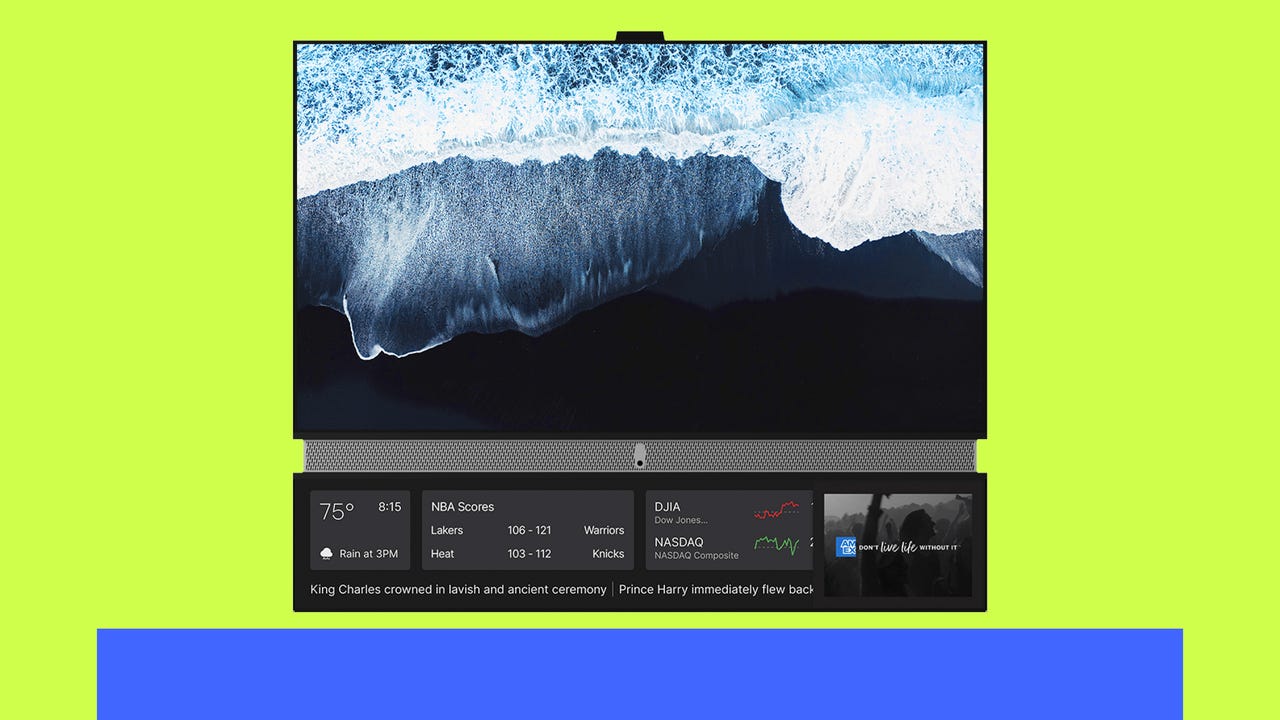































 Telly/
Telly/ A free 55-inch TV sounds like a dream, right? All you have to do in exchange is watch some ads. I signed up because I figured I've been watching TV with ads for as long as I can remember, so it's not a new concept.
What's new in this 'deal' is that the free 55-inch television has an attached screen at the bottom where the ads are displayed. And the free TVs have already started shipping.
Also: WormGPT: What you need to know about the cybercriminal version of ChatGPT
But surely nothing is completely free, so how are youreallypaying for the fancy 55-inch 4K TV? The answer to that question is the same as most things when we talk about the internet: you're paying with your data.
We first told you about the Telly dual-screen TVs during the company's campaign in May. Telly announced its plans to ship 500,000 free televisions by the end of 2023, with plans for millions more to come in 2024.
In the first week of the campaign, over 250,000 customers registered for a free 4K TV -- two-thirds of the registrants were millennials or from Gen Z, both increasingly hard-to-reach populations for advertisers.
Also: Create your ultimate home theater with the best 85-inch TVs
Telly announced that those TVs already started shipping last week, as well as some advertisement partnerships with Magnite and Microsoft. The TVs will support Spotify and LiveOne for audio-streaming services.
Telly also announced that Nielsen, a data measurement firm, will license Telly's data to gather and analyze unique viewership information, which will provide valuable insights to advertisers and TV programmers.
"We are thrilled to begin shipping what is by far the smartest television ever built to consumers," said Ilya Pozin, CEO and founder of Telly.
"Our disruptive ad-supported business model makes the television completely free to consumers, but the most exciting thing about Telly is the technology that enables our dual-screen television to get better with every update. We can't wait for consumers to see what a truly smart TV can do as we continue to surprise and delight Telly households for years to come."
Also: Should you buy an 8K TV? How to decide, according to an expert
To reserve a Telly, you need to give the company your full name and shipping information, including a valid U.S. phone number. Then, you have to download the Telly app to confirm your account, where you have to agree to their data collection terms and complete a survey to gather your preferences information, which helps the company create an advertising profile about you.
Now, keep in mind that this data-gathering process takes place before you even receive your TV.
Dallas Lawrence, chief strategy officer at Telly, explains the process: "Nearly all smart TVs today collect data on consumption and viewership. The only primary difference between the data we collect on consumption and viewership and what every major TV manufacturer collects today is that we ask the consumer up front to share it, and we give them a$1000+ TV for free in exchange."
Also: OLED vs. QLED: Which is better for you?
That might be the process that viewers sign up to, but when do we cross the line from a mutual agreement into surveillance?
Telly TVs, for example, have a built-in camera system that customers can use for video-conferencing and exercise apps, as well as games and other motion-tracking software.
The inclusion of the camera system is a turnoff for me, especially considering how many people already place a cover over their laptop cameras.
However, Lawrence says the camera doesn't record or transmit anything to Telly. It ships with a physical shutter covering the camera, which the customer has to tell the TV to open, and it has a visual indicator that shows when it's in use.
Also: The best TV wall mounts (and how to install them safely)
Lawrence says this collection of features is just one example that "highlights our approach to consumer privacy and control".
So, here's the thing: many smart devices in our homes already gather data and sell it to data brokers -- yes, I'm looking at you, Alexa.
We knowingly sign up to this process -- we 'agree and continue' without reading the fine print and pass our data to tech companies without being aware of the potential implications.
Also:AI gold rush makes basic data security hygiene critical
I'll still be testing out a Telly TV if I get the chance. I'm willing to see what happens during the process, and I'll try and find out how the company handles my information.
But I also believe it's important to consider how lower-income families or audiences with limited awareness of the privacy issues at hand might get roped into the deal, attracted by the promises of a 'Free TV' and the used-car-salesperson pitches.
Stay tuned for how I get on.
 Hot Tags :
Home & Office
Home Entertainment
Hot Tags :
Home & Office
Home Entertainment